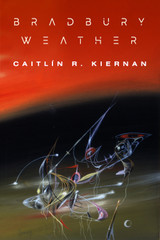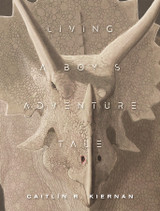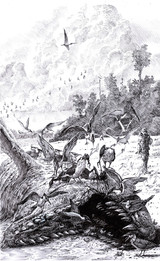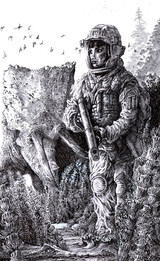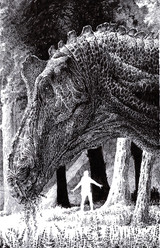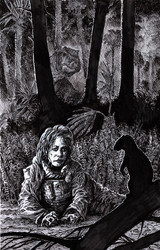Dust jacket illustration by Richard Powers.
We’re pleased to announce Caitlín R. Kiernan’s Bradbury Weather, their largest collection yet at 800 pages.
About the Book:
Though Caitlín R. Kiernan is known primarily as a preeminent author of the weird and the macabre, and is often cited as Lovecraft’s successor, during the three-decades of their career they have also been a prolific author of science fiction. Indeed, Kiernan’s first SF tales appeared in print before any of their weird fiction (“Persephone” and “Between the Flatirons and the Deep Green Sea,” both 1995). And while their science fiction has often been praised by critics, the author has only ever released a single collection specifically devoted to their SF — A is for Alien (2009). Finally, with the publication of Bradbury Weather, almost all of Kiernan’s science-fiction short stories and novellas have been collected in one volume.
These twenty-eight tales paint a picture of dystopian futures, first contacts gone horribly awry, the limits and dangers of technology, and encounters with the alien within us all. From Earth to Mars to distant exoplanets, from the past to the present to the future, Kiernan surveys a cosmos that is strange and marvelous and oftentimes inimical to human life. A paleontologist by training, they bring to their SF a deep understanding of science, its methods, and its limits, with their scientific background often informing and lending an authenticity to their tales of deep time, deep space, extraterrestrial life, and things that might be.
The signed limited edition of Bradbury Weather will be accompanied by Living a Boy’s Adventure Tale, a time travel novella making its print debut. (See below for a full description.)
Limited: 600 signed numbered hardcovers with the bonus volume, Living a Boy’s Adventure Tale
Trade: Fully cloth bound hardcover
About Living a Boy’s Adventure Tale
In 1989, the US government becomes aware of a strange ribbon of light pulsating in the skies above the freezing, desolate plains of Harding County, South Dakota, a ribbon of light that proves to be a portal to one specific moment in time, sixty-six million years in the past. Not very long before an immense asteroid collided with the earth, ending the world of the non-avian dinosaurs. This one moment in the distant past becomes a place that can be visited, observed, studied, even exploited by corporations and big-game hunters.
A paleobotanist arrives on the shore of shallow sea in South Dakota, and though she’s only come to study extinct plants, soon she will come face to face with one of the most terrifying creatures inhabiting this world.
In the tradition of Ray Bradbury’s “A Sound of Thunder,” Caitlín R. Kiernan draws on their expertise as a paleontologist and geologist to recreate a vanished era, then shrouds it in modern-day conspiracy and espionage.
Table of Contents:
- Author’s Introduction
- Riding the White Bull
- Faces in Revolving Souls
- Onion
- Galápagos
- Zero Summer
- The Pearl Diver
- In View of Nothing
- Ode to Katan Amano
- Hydrarguros
- A Season of Broken Dolls
- Tidal Forces
- The Steam Dancer (1896)
- The Dry Salvages
- The Worm in My Mind’s Eye
- Tall Bodies
- Paleozoic Annunciation
- Our Lady of Arsia Mons
- I Am the Abyss and I Am the Light
- The Road of Needles
- Another Tale of Two Cities
- Goggles (c. 1910)
- A Barrenness of Daffodils, A Lerna of Ills
- Ballad of a Catamite Revolver
- Whilst the Night Rejoices Profound and Still
- Cherry Street Tango, Sweatbox Waltz
- A Chance of Frogs on Wednesday
- M Is for Mars
- Bradbury Weather
- Living a Boy’s Adventure Tale (bonus volume, to accompany the signed limited edition only)
Living a Boy’s Adventure Tale
(excerpt)
The big bull’s nasal horn caught me, and what came to mind right then was not how immensely I was fucked, it was a scene from a film I saw years and years and years ago, maybe even when I was a child, footage from Pamplona, Spain, the running of the bulls, only those were a very different sort of bull, weren’t they? But that’s what I was thinking of as I left the ground and briefly, for the space of ten or twenty yards, parted ways with gravity, I was remembering the running of the bulls, encierro, hundreds of men squeezed into narrow avenues and the runners were singing a benediction, three times through, in Spanish and in Basque, the shout “¡Viva San Fermi Gora San Fermi!” goes up, and they’re running down those narrow streets, and close behind them are angry bulls the color of clay and night. I close my eyes. I’m not in nearly as much pain as I should be. The suit’s seen to that, dispensing generous doses of painkillers as soon as it sensed the damage to my body. And how much damage is there? I wonder, but I wonder it distantly, without any urgency or panic. How busted up am I? The left leg, sure, that’s for certain, and I might even lose it. But what else. I shut my eyes and the encierro is there again, and the huge fucking aptly named Triceratops horridus is there again, big as a goddamn Sherman tank, but what I see is a young man dressed all in white, a red sash cinched about his waist, and I am him, and he is me, and the bull gores him to death right there on the street with a thousand spectators looking on and some asshole with a camera filming it all.
Stop it, I only think I say aloud. Just stop it. Run the protocol. You know what’s happened. And you’re still conscious. So buck up, little buckaroo and do your fucking job, and maybe, just maybe, you’ll come out of this thing alive.
Then a moment later I realize that I haven’t actually said anything, not aloud, and those words were trapped inside my head.
I’m lying in a thicket of cinnamon ferns, cushioned in their fronds like some shattered sci-fi Disney princess, and there’s a Metasequoia and a big ginkgo not far away. The redwood points at the blue Hell Creek sky like it’s trying to show me the way home.
“Work the problem,” I say, and this time I really do say the words, and I mean what I say, trying to spur myself to action, but I just lie there, instead, looking at the dawn redwood and the sky and a huge azhdarchid pterosaur wheeling on the thermals a couple hundred feet overhead. I suspect I have a head injury. That would explain a lot, wouldn’t it. Maybe I’m lying here with the last of my consciousness flowing out of me like gleeful men in white and red running for their lives down a winding Spanish street. I close my eyes again, and there’s the Triceratops, a monster that must have been thirty-five, forty years old, a fucking brute of a beast, and it proudly wears the scars of all its battles – the sparring with other males for the right to mate, countless run-ins with tyrannosaurs, parasites, infections, disease, and yet it has survived all of that to catch me by surprise and kill me.
The Dry Salvages
(excerpt)
I opened my dry, gummy eyes, more than seventeen Earth years after I’d shut them – though not quite seven and a half years had passed on the Montelius – and stared up, at, and through the nonreflective dome of my stasis cell. The agency had spent years perfecting a transparent polymer that would eliminate as much reflection as possible, to help offset the cognitive dissonance that usually comes with knowing so much time has passed, out there, while, snug inside your cocoon, you’ve aged hardly at all. And, of course, no one ever looks particularly apple after years of stasis. The life-support systems and the medbots are there to keep you alive and healthy, not pretty. So, they save the mirrors for later, because out on the lanes, it’s all about morale. There were signs posted in every corridor on the Montelius: “Safety first,” they would solemnly, cheerfully intone whenever you approached, “and don’t forget – a happy traveler is a safe traveler.” After the incident with the Aegis, back in 2123, ANSA finally started taking psychometrics a lot more seriously. Ten dead, half the droids gutted beyond repair, and an Explorer-class fleet-tube MIA for half a decade, you better fucking believe it got the attention of the ekzecs and expenditure snipes. The Aegis was the last human crew to make the trip from one star to another awake.
Cherry Street Tango,
Sweatbox Waltz
(excerpt)
The hotel room is hot as blue blazes, and it smells hot, and it also smells simultaneously of dust and mildew, so both dry and damp at the same time. The room is, in fact, almost unbearably hot, and I sit on this sofa, alone in my private darkness, and I sweat and listen to the radio. Usually, there’s only music, jazz from a hundred years ago, discord and jangle and innumerable arrhythmic anti-harmonies on piano and clarinet and baritone saxophone that seem composed to mock my disorientation. But then I am a paranoid woman. It comes with the job, the paranoia. You bring it with you to the job or you pick it up soon afterwards or you don’t live very long. And, hell, sometimes even the paranoia won’t save you. Anyway, the radio plays and I sit here listening to the jazz, sweating in someone else’s silk bathrobe, cradled in frayed upholstery, alone in the hot darkness behind the bandages that cover my flash-burned eyes. I might have been sitting here for hours. I lose track of time, in between sleeping and being awake. But finally the music stops, as it periodically does, and a man with a heavy Hungarian accent comes on in its place, and he wants to know if I’m feeling any better than I felt the last time we talked. I tell him sure, I feel like a million bucks, and he reminds me how snark and sarcasm isn’t going to cut it. His time is precious. On the other hand, my time, like my life, is disposable, expendable, no kind of rare dish, me, and I should therefore conduct myself accordingly. Which is to say, I should behave.
“Last name first,” he says. “First name last.”
I have lost count of how many times I’ve given my name to the man on the radio. I lick my dry lips, wishing for anything wet besides my own inner sea leaking out of me. “Sakellarios,” I reply. “Elenore.”
“Are you in pain tonight, Ms. Sakellarios?” the man with the Hungarian accent wants to know.
“Nothing has changed since the last time we talked,” I say.
The radio crackles with a burst of static, and I wonder if that’s all I’m going to get from him until next time. Sometimes it’s just that short. Other times I think he’s gonna yammer on forever. Anyway, this time the static fades and he’s still here with me. Sweat runs down my face and drips onto my hands where they lie folded together in my lap.
“It’s a dream-kill-dream world in here,” says the man on the radio.
M Is for Mars
(excerpt)
This is likely not the most appropriate place or time to recount the numerous mistakes and misfortunes that had led me from the relative comfort and civilization of Herschel City to the squalor and disrepair of the Kayne agridome, some fifteen hundred kilometers east of Herschel, where the highlands drop away to the ragged edges of the Elysium Planitia. Geologists tell us it was once the shore of the great Martian ocean, billions of years ago, and they can show you the rocks and the fossils to support their claims. They can point to the winding course and exposed strata of the great Ma’adim Vallis, where it opens out onto the dry lakebed that is Gusev Crater, just east of Kayne. But no amount of geology or rumors of lost waterways can serve to make the frontier seem anything less than desolate, or conjure the sense that there were ever truly flowing rivers or waves breaking against those parched stones. But I am Marsborn, and so everything I know of the sea is secondhand knowledge.
It does not matter how I came to find myself living in Kayne, teaching math and reading and geography to the children of dew farmers and mechanics, living above a junkyard in a two-room housing module that was already an antique before my mothers were born. It only matters that I did, and that I was there on that windy night when they brought the waste runners in, three days past the summer solstice. They’d been found by a prospecting gang, somewhere in the hills out beyond the marker buoys. By the time the pair reached Kayne they were both unconscious and as near to death as any woman goes without slipping across. Their suits had failed or been breached (I never learned which), and both were suffering advanced decompression. The prospectors claimed the pair were still somewhat cognizant when they were discovered, huddled together inside a wrecked crawler, bogged down at the lip of a dust sink. The vehicle’s tracks led off to the north, consistent with what the prospectors said the women had told them before finally losing consciousness. The runners both died before dawn. It is a wonder they lived as long as that, and it is a goddamned mercy they did not live any longer.
Bradbury Weather
(excerpt)
I still have all the old books that Sailor left behind when she finally packed up and went looking for the Fenrir temples. I keep them in a big cargo crate with most of her other things, all that shit I haven’t been able to part with. One of the books, a collection of proverbs, was written more than two hundred years ago by a Gyuto monk. It was published after his death in a Chinese prison, the manuscript smuggled out by someone or another, translated into Spanish and English, and then published in America. The monk, who did not wish to be remembered by name, wrote: “No story has a beginning, and no story has an end. Beginnings and endings may be conceived to serve a purpose, to serve a momentary and transient intent, but they are, in their truer nature, arbitrary and exist solely as a construct of the mind of man.”
Sometimes, very late at night, or very early in the morning, when I should be sleeping or meditating, I read from Sailor’s discarded books, and I’ve underlined that passage in red. If what I’m about to write down here needs an epigraph, that’s probably as good as any I’ll ever find, just as this beginning is as arbitrary and suitable as any I could ever choose. She left me. I couldn’t have stopped her, not that I ever would have tried. I’m not that sort of woman. It was her decision, and I believed then it would have been wrong for me to interfere. But six months later, after the nightmares began, and I failed a routine mental-health evaluation, I resigned my teaching post and council seat and left to chase rumors and the ghost of her across the Xanthe Terra and Lunae Planum.
- artists_list:
- Richard Powers
- authors_list:
- Caitlin R. Kiernan
- binding:
- Hardcover
- book_case:
- None
- book_edition:
- Limited
- book_length:
- 800 pages [main volume]
- book_type:
- Collection
- country_of_manufacturer:
- United States
- isbn:
- 978-1-64524-150-8
- is_subpress:
- Yes
- print_status:
- In Print
- year:
- 2023


